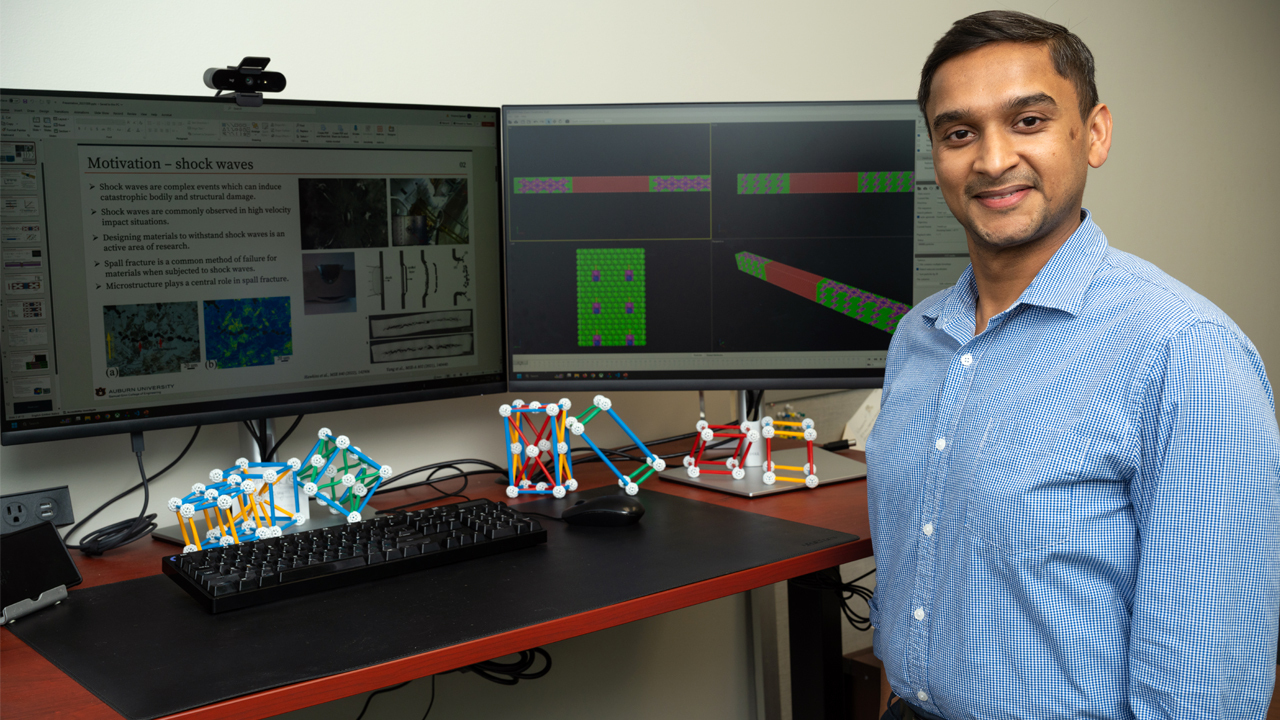Aerospace Engineering assistant professor earns NSF CAREER award to study nanocrystalline alloys
Published: Apr 3, 2024 8:00 AM
By Dustin Duncan
As space exploration expands, the materials used in space missions must improve.
Vinamra Agrawal, assistant professor in the Department of Aerospace Engineering, is studying stable nanocrystalline alloys and their performance in harsh environments — typical of space missions — to determine whether they are viable candidates for materials for structural components.
Agrawal recently received a $647,000 National Science Foundation (NSF) CAREER Award titled “Investigating the role of microstructure in the high strain rate behavior of stable nanocrystalline alloys.”
“The choice of materials becomes very important when designing structural components for space exploration because we need materials that can survive harsh environments,” Agrawal said. “The choice of materials or the combinations of materials you use will ultimately decide the mission's success.”
What makes a stable nanocrystalline alloy strong? What makes this material useful in harsh environments, particularly in high-velocity impact and thermal shock situations? Agrawal plans to answer these questions to inform future design of materials and, ultimately, a material that is just right for these applications.
Agrawal said extreme temperatures are common in space missions.
“If you have a rocket engine, you need materials for a nozzle that can survive extreme temperatures from fuel burning,” he said. “Similarly, shielding materials must survive extreme temperatures associated when leaving or entering the atmosphere."
Agrawal said orbital debris and micrometeorite impact are common considerations when designing missions. Protective structures must be designed to protect humans (in manned missions) and internal components from very high-velocity impact due to debris and micrometeorites. Novel, lightweight materials capable of mitigating damage due to such impacts can significantly contribute to the mission’s success.
Agrawal has been studying materials exposed to extreme environments since he was a graduate student at the California Institute of Technology. The materials science community has studied stable nanocrystalline alloys for years, so the alloys themselves aren’t new. However, a few years ago, U.S. Army Research Laboratory researchers began testing stable nanocrystalline alloys and demonstrated their resilience to harsh environments.
That’s where Agrawal and his team come in. They want to push these alloys, find out how their internal structure behaves under harsh environments and eventually find their breaking point. He has a novel computation technique to simulate materials under harsh environments from the ground up — from the scale of atoms (nanometers) to the scale of engineering applications (meters).
“Existing methods are computationally expensive, making it unfeasible to connect materials structure at the atomic scale to its behavior at engineering scales. That’s where we come in,” Agrawal said. “Our technique makes it feasible to recreate those harsh environments in our simulations, unravel mechanisms at the atomic scale and understand what makes these alloys perform so well at the engineering scale.”
Another portion of Agrawal’s NSF CAREER award is educational. He’s working to develop a novel platform called Mechblocks. He said Mechblocks are essentially Lego-like blocks, each with a unique characteristic, that can be assembled in different ways to demonstrate concepts in mechanics and materials science.
“We can demonstrate fundamental concepts like the strength of a material, failure and wave propagation in a hands-on way, making it accessible to K-12 students, parents and educators,” Agrawal said.
Agrawal will partner with local science museums and children's centers to use Mechblocks to provide K-12 students, parents, and educators with a unique exposure to materials, mechanics, and structures. Agrawal said that Mechblocks will promote mechanics and materials science education and help train the next generation of the STEM workforce.
“It’s difficult to convey these ideas in an exciting way,” Agrawal said. “These blocks provide a hands-on experience for students to see what happens when you’re breaking something.”
Brian Thurow, aerospace engineering chair, said an NSF CAREER Award is one of the highest honors that an early career faculty member can achieve.
“I am very proud of Dr. Agrawal and pleased that he is receiving this well-deserved recognition,” Thurow said. “Dr. Agrawal has been absolutely dedicated towards building a career focused on aerospace materials research, education and outreach. The recognition and activities enabled through this program will position Dr. Agrawal to take the next big step forward in his career and establish him as a leading researcher in the field on an international stage.
Media Contact: , dzd0065@auburn.edu, 334-844-2326
Vinamra Agrawal, assistant professor in the Department of Aerospace Engineering, shows his research that helped earn him a NSF CAREER award to study stable nanocrystalline alloys and their performance in harsh environments.

